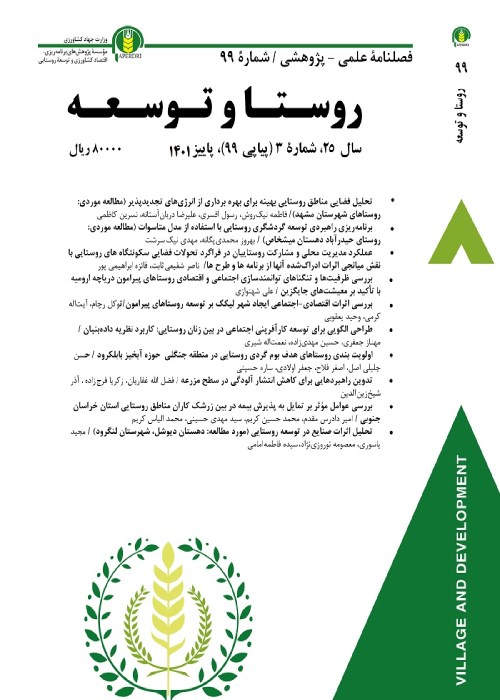Presenting a Success Model for Non-Governmental Organizations Involved in Ecotourism Development in Iranian Rural Areas
Ecotourism aims to strengthen environmental impacts and improve local living conditions particularly in rural communities, however, proper management of the operations is necessary to preserve and maintain the biological richness of the region as well as the economic progress of local community. The new theoretical perspectives of development consider a very important role for non-governmental organizations in the realization of people-oriented development. Non-governmental organizations participate in the process of planning and developing ecotourism and aim to converge different views and interests. These organizations should have special functions such as travel planning, training of ecotourism tour guides and development of sustainability in the local community. Despite this, until now the factors affecting the success of these organizations in the planning and development of ecotourism in Iran have not been investigated.
Using grounded theory strategy, this study enumerated the characteristics of successful non-governmental organizations and finally developed the model that explains the success of these organizations. The statistical sample of this study included 37 ecotourism specialists, managers and experts of non-governmental organizations engaged in ecotourism, government officials, and residents of the local community, which were selected purposefully with snowball sampling method. The interview questions were prepared in a semi-structured framework, based on the research questions. To ensure the quality of the research, in addition to triangulation, the strategy of participant feedback was used. Data analysis and interpretation were done through coding in three stages of open, axial and selective coding.
From the analysis of interviews, 64 open codes were derived and from the combination of these codes, six axial codes were obtained. The axial codes included endogenous development, asset-based community development, and codes of conduct of non-governmental organizations, professional characteristics of successful non-governmental organizations, internal structural requirements and requirements of successful projects.Non-governmental organizations should pay attention to endogenous development that starts from the local community and is based mainly on the local knowledge, preferences, strategies, and context. Some of the open codes that construct the axialcode of “endogenous development” include improving the satisfaction of the local community, determining the goal by the local community, assigning control of the project to the local community and ensuring fair benefit-sharing, distributing benefits equitably among local community members, preventing local elite capture, and creating mutual trust in the local community. Also, putting together the nine open codes, such as paying attention to the potential abilities of the local community, rehabilitating the local community and revitalizing the attractions, objectifying the value of the local community's assets, raising sweat in the local community, and dealing with problems based on indigenous knowledge, construct the axial code of “asset-based community development”.
According to the model of our study, non-governmental organizations can promote ecotourism and bring positive impacts in rural areas if they:1- Adopt endogenous and asset-based development approach as the dominant and governing paradigm of their programs and activities;2- Comply with codes of conduct and3- Have a good internal management and professional characteristics.Meanwhile, paying attention to the direct participation and benefit of the local community in planning and managing ecotourism projects and informing the local community about the revenue-generating potential of local assets and attractions is recommended for the success of non-governmental organizations.
- حق عضویت دریافتی صرف حمایت از نشریات عضو و نگهداری، تکمیل و توسعه مگیران میشود.
- پرداخت حق اشتراک و دانلود مقالات اجازه بازنشر آن در سایر رسانههای چاپی و دیجیتال را به کاربر نمیدهد.


